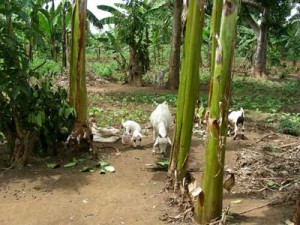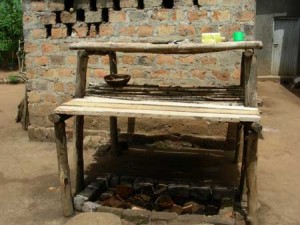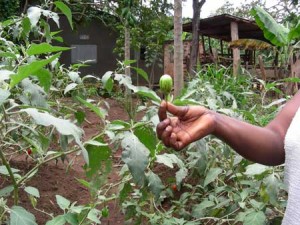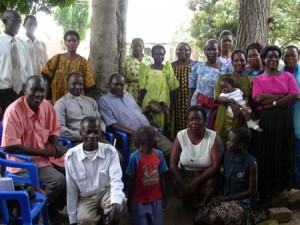Mothers’ Union members in the Diocese of Winchester contribute directly, and through fund-raising events to projects being run by members in other countries.
The Family Life Programme (FLP) started as a project in four Ugandan Diocese, with the aim of improving the value and quality of family life. It has proved incredibly successful and is now being extended carefully to integrate into Mothers’ Union work in some other diocese in Uganda.
The FLP is based on three themes, which were those consistently chosen by members of the pilot groups as being the key areas whose improvement would benefit the value and quality of family life:
- health and hygiene;
- poverty alleviation;
- environmental management.
FLP Trainers in each participating Diocese provide examples in their ‘model’ homes of good hygiene, sanitation and cultivation techniques. Each trainer works to identify groups of people in communities in their region who will work together to learn these skills.
Each FLP group nominates a “facilitator”, the person who works closely with the Trainer, learning the detailed practical techniques, and then teaching other learners in the group. The facilitators’ home in turn becomes a ‘model home’ for their local community.
One of the most impressive features of the model home in Lowero Diocese, is the thought that has gone into sanitation and the hygienic management of water. For example a simple wash stand has two levels, one for washing and a higher one for drying, both set up over rocks (collected to ease cultivation) which reduce the puddling which would otherwise attract flies and thus spread disease.
The cultivation of a range of plants that can be used either as food, or for medicinal purposes as the ingredients for medicines and salves, is another strong element of the training offered through FLP. For example a number of varieties of ‘bitter berry’ are grown which, when green, can be used to reduce high blood pressure. Some fruits are also allowed to ripen so that there is always a seed crop.
There is a two-way relationship between plant cultivation techniques and the management of livestock. Chickens, billy goats and cattle are kept in purpose built pens that looked like they were on stilts – the slatted platform on which they were kept being nearly 2 feet off the ground. This allows their droppings to fall underneath and be easily collected to form compost with other waste. Areas of cultivation are divided by small ditches and banks covered in a very tall grass. These reduce the erosion and prevent the reduction of soil fertility caused by the torrential rainstorms that are experienced in the region. The grass is cut and used to feed the livestock in the pens, after being ‘wilted’ for a couple of hours for harmful insects to fly away.
Vital to the success of the project is that some of the facilitators are men. They can make a real difference to the acceptance of the project’s work within individual communities, especially with regard to health and relationships. The national project director has worked with the Ugandan government’s health department to develop a ‘fistula project’ as an off-shoot of the FLP scheme. Women are often ostracised by their husbands, families and communities if they suffer from fistular. These are holes in the urinary tract which cause urine to pass into the wrong place creating acute burning pain, infections and a foul smell.
Men’s FLP group have proved vital in educating their communities about the preventable causes of fistula (often complications during childbirths which do not have trained supervision) and the availability of treatment for this problem. Through the ‘sensitisation’ of men to the subject, a whole variety of benefits are provided to marriage relationships as well as women’s health and their ability to care for their families.
Each Diocese in which the FLP operates has the same broad categories of work, but the way that these are put into practice varies depending on the individual geography, flora and cultural needs of each region.
The expansion of the Family Life Programme in Uganda is being funded through the Overseas Fund of the Mothers’ Union. If you wish to make a donation, please send it to our contact address, marked for the Overseas Fund, and made payable to Mothers’ Union Diocese of Winchester.




